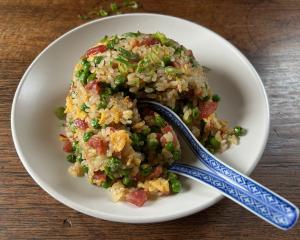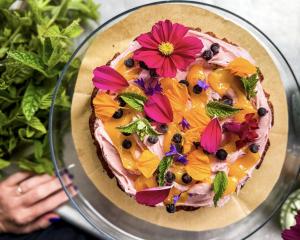
Slow-cooked aubergine with yoghurt and cucumber
My greengrocer sells aubergines of various sizes in precarious piles, each one as glossy as wet paint. Removing the one you want is like playing vegetable Jenga.
I like my aubergines baked until on the verge of being overcooked. So silky, so plump, so melting, they’re almost more olive oil than aubergine. And let’s face it, without olive oil there is very little point to this vegetable (fruit to the pedantic). Baked or grilled, I cook them with their skins on — and eat them too. I only occasionally take the peeler to them, but they look elegant without their skins, scattered with lemon zest and parsley or in a pool of their own bronze baking juices.
You can brown them in oil, then braise them with ginger, garlic, cumin and turmeric, adding a little water or vegetable stock and basting them with their own thin, aromatic juices. Sweetened with honey and sultanas, they are good eaten with yoghurt. Thicken it with shredded cucumber and chopped pistachios, if you wish. This way of cooking them, with spices, water and covered with a lid, encourages a silky texture without emptying your olive oil bottle.
I also got out the cake tins this week. I could have used individual bun tins or paper cake cases, but instead chose individual bundt tins. These are the only fancy cake tins I have, but I love them for their swirling lines, deep ridges and hollows that hold frosty pools of citrus-scented icing. I covered them with thin, almost transparent icing sharpened with lemon juice lending just the right amount of sweetness to a plain, moist cake.
Start the recipe with 100ml of oil, adding a further amount, up to 50ml, if the aubergines become dry.
Serves 4 as main dish with rice
750g (3 medium to small) aubergines
100-150ml, plus a little more, olive oil
50g fresh ginger
2 cloves garlic
½ tsp salt flakes
½ tsp ground black peppercorns
1 tsp ground turmeric
1 tsp ground cinnamon
To finish
2 Tbsp honey
50g golden sultanas
2 Tbsp mint leaves
2 tsp dried rose petals
For the yoghurt sauce
100g yoghurt
200g cucumber
6, plus 2 Tbsp to garnish, mint leaves
1 red chilli
2 Tbsp pistachios
Peel the aubergines and slice them in half, top to bottom. Cut each half into 3 thick pieces.
Warm 100ml of olive oil in a wide, shallow pan over a moderate heat. I use one with a 24cm base. Place as many aubergine pieces, cut-side down, as you can comfortably fit in the pan and let them cook until golden on the underside, about 4-5 minutes. Keeping the heat fairly high, turn each piece with kitchen tongs and leave to colour the other side. Loosen them with a palette knife as they cook, so they don’t stick. You may need to top up the oil from time to time. Aubergines are heavy drinkers. Remove them as they become ready and replace with the rest of the aubergines.
Peel the ginger, slice thinly, then cut into matchstick-size pieces. Peel and crush the garlic. When all the aubergines are golden and removed from the pan, lower the heat a little, add the ginger and garlic followed by the salt, pepper, turmeric and cinnamon. Let the spices sizzle for a minute or so, stirring regularly — they mustn’t burn — then pour in 600ml of water, turn up the heat and bring to the boil.
Return the aubergines to the pan, lower the heat to a simmer, partially cover with a lid — you just want a crack for the steam to escape — and cook until truly silky and tender. Check and turn them from time to time, but they should take about 25-30 minutes. They should be so soft you could crush them between finger and thumb. Keep an eye on the liquid level.
For the sauce, put the yoghurt into a bowl, peel and cut the cucumber in half lengthways, scrape out and discard the seeds, then coarsely grate the flesh and stir into the yoghurt. Shred the mint leaves, finely chop the chilli and roughly chop the pistachios and fold all into the yoghurt.
Remove the aubergines to a serving dish, then stir the honey and sultanas into the cooking juices. Turn the heat up, let the sauce reduce a little, then taste adding a little salt, pepper or honey as you wish (bear in mind you will be eating it with the yoghurt sauce). Scatter with the mint leaves and rose petals. Serve with the yoghurt and rice.
 Orange and almond bundt cakes
Orange and almond bundt cakes

You will need six individual tins, but, if you prefer, use deep paper cake cases.
Makes 6
200g, plus a little for the tins, butter
200g caster sugar
1 lemon
1 small orange
100g skinned almonds
100g, plus some for the tins, self-raising flour
3 eggs
For the icing
85g icing sugar
2 Tbsp lemon juice
2 tsp poppy seeds
Set the oven at 180degC. Prepare the cake tins by melting a little extra butter, brushing it over the inside of the tins, then dusting them lightly with flour. Turn the tins upside down and shake lightly to remove any excess flour.
Cream the butter and sugar together in a food mixer until pale and fluffy. Finely grate and add the orange and lemon zest. Grind the almonds to a coarse powder in a food processor then stir in the flour. Break the eggs into a small bowl and beat thoroughly with a fork.
When the butter and sugar are well creamed, add the flour-almond mixture and the beaten eggs, alternately and a little at a time, beating continuously. Mix lightly but thoroughly then spoon into the cake tins, smoothing the surface as you go.
Bake for 20-25 minutes until the cakes have risen. Test with a skewer. Remove from the oven and leave to settle for 5 minutes. Turn out on to a cooling rack.
For the icing, sieve the icing sugar into a small bowl, squeeze in the lemon juice and mix to a smooth icing about the consistency of cream. It should fall from the spoon quite slowly — too thin and it will slip off the cakes.
Trickle the icing over the cakes, sprinkle the poppy seeds on top and leave in a cool place to set. — Guardian News & Media











